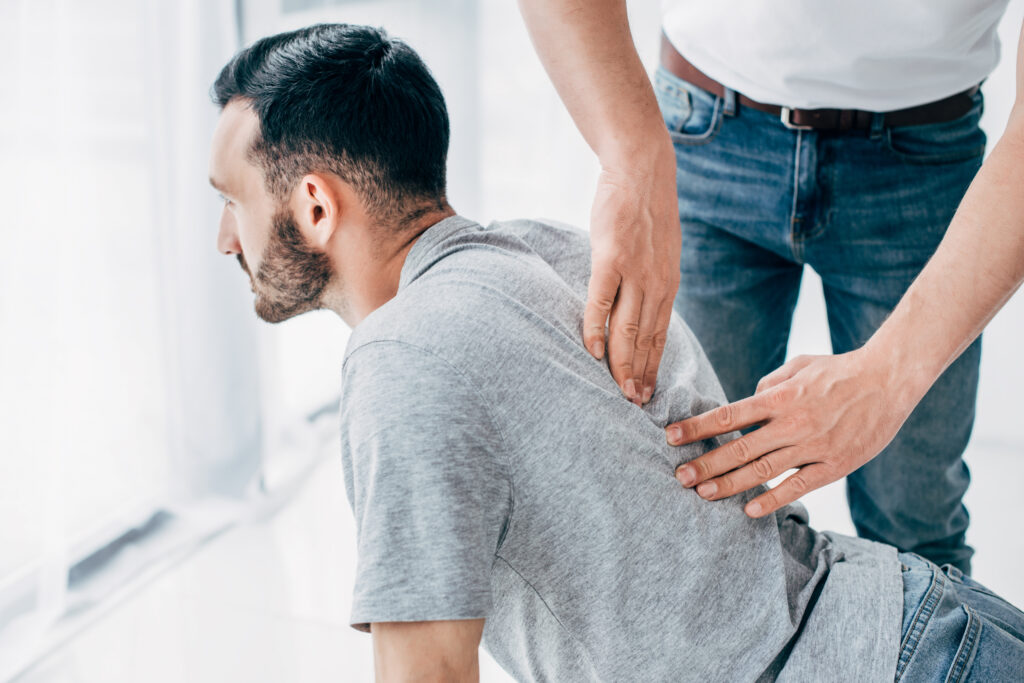You might be surprised by how non-invasive stress relief techniques can transform your daily life. By engaging in practices like mindfulness or deep breathing, you can enhance your mental clarity and improve your emotional well-being. These methods not only help you cope with stress but also promote better sleep and physical health. As you explore these techniques, you may find yourself more resilient in the face of challenges. Curious about how these benefits can manifest in your life and what specific practices to contemplate?
Improved Mental Clarity
Non-invasive stress relief techniques can greatly enhance your mental clarity. When you incorporate practices like mindfulness meditation, deep breathing, or gentle yoga into your routine, you'll notice a shift in how clearly you think. These methods help reduce the clutter in your mind, allowing you to focus on what truly matters.
As you start to engage in these techniques, you might find that distractions become less overwhelming. For instance, deep breathing exercises can calm your nervous system, helping you clear your thoughts and concentrate better. When your mind isn't weighed down by stress, you can process information more effectively, making decisions easier and faster.
Mindfulness meditation, in particular, trains you to observe your thoughts without judgment, creating a space for clarity. By dedicating just a few minutes a day to this practice, you'll enhance your ability to think critically and creatively. You'll find yourself approaching problems with a fresh perspective, leading to innovative solutions.
Additionally, gentle yoga can improve blood flow and oxygen to your brain, which is essential for maintaining focus. As you move through the poses, you'll cultivate a sense of awareness that translates into mental sharpness throughout your day.
Incorporating these non-invasive techniques into your life doesn't just relieve stress; it opens the door to a sharper, more focused mind. By prioritizing your mental clarity through these practices, you'll set the stage for improved performance in all areas of your life.
Enhanced Emotional Well-Being
Enhancing your emotional well-being starts with embracing non-invasive stress relief techniques that foster a positive mindset. When you prioritize these methods, you create a supportive environment for your emotions to thrive. This approach not only helps you manage stress but also enables you to cultivate resilience, allowing you to face life's challenges with a more balanced perspective.
By engaging in non-invasive stress relief practices, you can experience a range of emotional benefits, including:
- Increased self-awareness: Taking time to reflect on your feelings enhances your understanding of yourself, making it easier to navigate emotional ups and downs.
- Improved mood: Techniques like mindfulness and deep breathing can elevate your mood, helping you feel more optimistic and engaged with life.
- Greater emotional resilience: Regularly practicing stress relief can strengthen your ability to bounce back from setbacks, leading to a more stable and satisfying emotional state.
Incorporating these techniques into your daily routine doesn't have to be complicated or time-consuming. Simple practices such as meditation, yoga, or even taking a walk in nature can notably influence your emotional landscape.
As you consistently make these choices, you'll likely find that your emotional responses become more balanced, and you'll develop a greater sense of overall well-being.
Better Sleep Quality
Quality sleep is essential for your overall health and well-being, and incorporating non-invasive stress relief techniques can greatly improve your nightly rest. When you experience stress, your mind races and your body tenses, making it difficult to unwind and fall asleep. By utilizing methods such as mindfulness meditation, deep breathing exercises, or gentle yoga, you can calm your mind and body, paving the way for better sleep quality.
These techniques help to activate your body's relaxation response, reducing cortisol levels and allowing you to drift into a deeper sleep. Even just a few minutes of mindful breathing before bed can shift your focus away from daily stressors, helping you create a peaceful bedtime routine. This kind of preparation makes it easier to fall asleep and stay asleep throughout the night.
Moreover, non-invasive stress relief practices can enhance your sleep architecture. This means you'll spend more time in restorative sleep stages, which are vital for recovery and rejuvenation. You might find that as you consistently integrate these techniques into your life, you not only fall asleep faster but also wake up feeling more refreshed and energized.
Ultimately, investing in non-invasive stress relief isn't just about managing stress; it's about cultivating a lifestyle that prioritizes quality sleep. By making these practices a part of your nightly routine, you'll be equipping yourself with the tools to enhance your overall sleep quality, leading to improved mood, focus, and daily performance.
Increased Physical Health
When you engage in non-invasive stress relief techniques, you can boost your immune function and keep your body healthier overall.
Lower blood pressure is another benefit that comes with managing stress effectively.
Enhanced Immune Function
Non-invasive stress relief techniques can greatly boost your immune function, leading to better overall physical health.
When you reduce stress, your body can focus on fighting off illnesses and infections more effectively. Stress often weakens your immune response, making you more susceptible to various health issues. By implementing stress relief methods, you can enhance your body's natural defenses.
Here are a few effective non-invasive techniques to improve your immune function:
- Mindfulness Meditation: Taking just a few minutes each day to practice mindfulness can lower stress hormones and enhance immune activity.
- Deep Breathing Exercises: Engaging in deep breathing can help calm your mind and body, promoting relaxation and boosting your immune system.
- Regular Physical Activity: Gentle exercises like yoga or walking can reduce stress while also enhancing circulation, which is crucial for immune health.
Lower Blood Pressure
Lowering blood pressure can markedly enhance your physical health and overall well-being. High blood pressure often leads to serious health issues, including heart disease, stroke, and kidney problems. By incorporating non-invasive stress relief techniques into your daily routine, you can effectively lower your blood pressure and reduce these risks.
Practices such as deep breathing, mindfulness meditation, and gentle yoga can help calm your mind and body, promoting relaxation. When you engage in these activities, your body responds by releasing tension, which can help lower your heart rate and blood pressure.
Regular exercise also plays a significant role in maintaining healthy blood pressure levels. Even simple activities like walking or stretching can make a difference.
Additionally, staying connected with friends and family can provide emotional support, further reducing stress. This social interaction can lead to better heart health and improved blood pressure management.
Incorporating these non-invasive techniques into your lifestyle not only benefits your blood pressure but also enhances your overall physical health. Prioritizing stress relief can be a powerful step toward achieving a healthier, happier life.
Strengthened Resilience to Stress
When you practice non-invasive stress relief techniques, you build stronger resilience to stress.
These methods enhance your coping mechanisms, improve emotional regulation, and increase mindfulness in your daily life.
As a result, you're better equipped to handle challenges with greater ease and confidence.
Enhanced Coping Mechanisms
Resilience is an essential quality that empowers you to navigate life's challenges with greater ease. By enhancing your coping mechanisms through non-invasive stress relief techniques, you can build a stronger foundation for managing stress.
These techniques help you respond to difficulties more effectively, making it easier to bounce back from setbacks.
Here are some ways enhanced coping mechanisms can benefit you:
- Adaptive Thinking: You'll learn to shift your perspective, turning challenges into opportunities for growth.
- Proactive Problem Solving: You'll develop a more solution-oriented mindset, allowing you to tackle issues before they escalate.
- Supportive Networks: You'll foster connections with others, creating a network that provides encouragement and understanding during tough times.
As you incorporate non-invasive stress relief practices into your routine, you'll likely notice a shift in how you handle stressors.
You'll become more equipped to face challenges head-on, ultimately enhancing your overall resilience.
With these improved coping mechanisms, you won't just survive tough situations—you'll thrive, emerging stronger and more capable of overcoming whatever life throws your way.
Improved Emotional Regulation
Many people find that improved emotional regulation greatly enhances their ability to cope with stress. When you're better equipped to understand and manage your emotions, you create a buffer against the daily pressures that life throws your way. This means you're less likely to react impulsively or become overwhelmed by negative feelings.
Harnessing non-invasive stress relief techniques—like deep breathing, progressive muscle relaxation, or guided imagery—can help you develop this emotional awareness. As you practice these methods, you'll start to notice patterns in your emotional responses, allowing you to pause and choose healthier reactions. Instead of getting swept up in anxiety or frustration, you'll respond more thoughtfully, which strengthens your resilience.
Moreover, improved emotional regulation fosters healthier relationships. When you can manage your feelings, you're better equipped to communicate and empathize with others. This not only reduces conflict but also enhances your support network, providing you with additional resources during tough times.
Ultimately, the ability to regulate your emotions equips you with the skills necessary to navigate life's challenges more effectively, leading to a more balanced and fulfilling existence.
Increased Mindfulness Practices
As you cultivate emotional regulation, you may find that increased mindfulness practices further enhance your ability to handle stress.
Mindfulness helps you stay grounded in the present moment, allowing you to approach stressors with a clearer mind. This heightened awareness fosters resilience, enabling you to respond thoughtfully rather than reactively.
Here are a few ways mindfulness can strengthen your stress resilience:
- Meditation: Engaging in regular meditation can help you observe your thoughts and feelings without judgment, promoting a sense of calm and control.
- Breath Awareness: Focusing on your breath can anchor you when stress arises, reducing anxiety and helping you regain your composure.
- Body Scan: Practicing body scans encourages you to tune into physical sensations, allowing you to release tension and cultivate a greater connection between body and mind.
Greater Mind-Body Connection
When you engage in non-invasive stress relief techniques, you naturally enhance your mind-body connection, allowing for a more harmonious interaction between your thoughts and physical sensations. This deeper awareness can greatly improve your overall well-being.
By focusing on practices like meditation, yoga, or deep breathing, you learn to tune in to your body's signals and recognize how stress manifests physically. As you cultivate this connection, you become more attuned to your emotions and how they affect your physical state.
You might notice that when you're anxious, your heart races or your muscles tense up. Recognizing these signs empowers you to address stress before it escalates. You'll find that your ability to respond to stress becomes more proactive rather than reactive.
Additionally, the greater mind-body connection fosters a sense of presence and clarity. You start to experience life more fully, with heightened awareness of your surroundings and your internal state.
This clarity helps you make better decisions, both mentally and physically, as you understand the interplay between your mind and body. Moreover, engaging in these practices can lead to improved emotional regulation.
As you learn to manage stress effectively, you might find yourself feeling more grounded and resilient in the face of life's challenges. Overall, enhancing your mind-body connection through non-invasive stress relief techniques creates a foundation for a healthier, more balanced life.
Conclusion
Incorporating non-invasive stress relief techniques into your daily routine can transform your life. You'll enjoy improved mental clarity, enhanced emotional well-being, and better sleep quality. As you strengthen your resilience to stress and boost your physical health, you'll also cultivate a deeper mind-body connection. Embracing these practices empowers you to face challenges with confidence and fosters a balanced, fulfilling life. So why not start today? Your journey to greater well-being is just a breath away!



